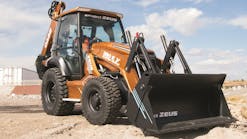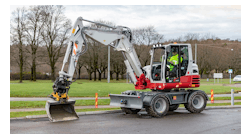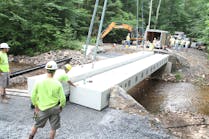In this article, we present in-depth profiles of five people – a recent high school graduate, a person with six years in the Navy as a flight mechanic, a 46-year-old machinist, and two women in their early 30s fed up with boring office work – who are recent graduates of heavy-equipment operator or technician training programs. Here’s why and how they did it and a look at the obstacles they had to overcome.
Don Boehmer: From Machinist to Tractor-Trailer Driver
After completing high school in Dayton, OH, more than 25 years ago, Don Boehmer enlisted in the United States Marine Corps for three years. There he served as a machine gunner in Adak, AK, guarding a naval-weapons compound. After that, he was transferred to Camp Lejeune, NC, where he worked in the supply office.
With an assist from his father, Boehmer was promised a job with the Hobart Corporation in Dayton, a manufacturer of scales for weighing all sorts of things, and of printers that print out labels displaying the weight. Boehmer left the Marine Corps and joined Hobart in its machine shop, where he learned on the job how to become a machinist and a toolmaker.
After the North American Trade Agreement went into effect in the 1990s, much machine-tool-making moved out of Ohio to Mexico, South America, and Asia, where labor costs were lower. By 2002, Boehmer found himself, together with many other Ohio machinists, standing in an unemployment line.
Scanning through newspaper want ads, Boehmer was impressed by the numerous listings for construction-industry jobs. “I had spent 25 years working inside four walls with no windows,” he explains. “All along, that had really bothered me. At 45 years of age, I was now determined to seek a job where there would be no walls – even if they did have windows. It was time to start a new career. The thought of getting a job in construction as a construction-equipment operator exhilarated me: I would be outdoors and there would be something completely new to learn.”
With retraining money from the State of Ohio, Boehmer enrolled in the Al-Win Heavy Equipment Operators’ School in West Jefferson, OH. He began the three-week hands-on operator-training program there in May 2002, with the Ohio government paying the full $5,000 tuition. At Al-Win, Boehmer trained on rubber-tire backhoes, loaders, bulldozers, small trackhoes, and trackhoes. He also learned how to make laser measurements in the field. He remarks that the program was very good and he learned a great deal.
Boehmer graduated from Al-Win in early June, going on job interviews with 10 construction companies. He was told it would be a major advantage for him to also have a Class A commercial driver’s license (CDL) so he would be able to drive the tractor-trailer lowboys used to haul construction equipment to job sites.
The Al-Win school helped Boehmer to enroll in a truck-driver training program at Clark State Community College in Springfield, OH, about 20 minutes northeast of Dayton. He started in June and finished in July. It was a solid program, he recalls, preparing students to operate tractor-trailers over the highway, including the hauling of tankers and hazardous materials. After four weeks, Boehmer had his Class A CDL.
Upon graduation, Boehmer renewed his search for a job as a construction-equipment operator. Concentrating his job search in southwest Ohio – a region he does not want to leave because his roots are there – some construction companies told him they wanted operators with more experience, others said that it was too late in the season, that they were beginning to wind down some of their construction activities.
By late August, Boehmer had located a job as a tractor-trailer driver for the Dayton Bag and Burlap Corporation. There, he hauls trailers around from one plant to another, usually short distances, a half a mile to a few miles or so. Wouldn’t he be happier driving cross-country? “Not me,” Boehmer replies. “A major reason I took this job is so I can be home every evening. Every person has different needs. Yet this job probably doesn’t pay as well as many heavy-equipment-operator jobs.”
Boehmer is enjoying his new job. He describes driving a tractor-trailer as challenging, requiring considerable skill to maneuver the truck in tight situations. Nevertheless, Boehmer clearly would prefer working as a heavy-equipment operator and is confident he will be able to land such a job once next year’s construction season rolls around. He realizes he might have to work initially for considerably less money than an experienced construction-equipment operator makes, but he is OK with that. “Right now, what is important is to get your foot in the door of a construction company somewhere and to get that all-important experience as a construction-equipment operator.”
John Johnson: From Naval Flight Mechanic to Heavy-Equipment and Diesel Truck Technician
John Johnson has lived most of his life in the Sanford area in central North Carolina. His father had always been a technically oriented person, being an iron-worker involved in erecting structural steel for bridges, power plants, and other projects and working on cars in his spare time.
Following his father’s lead, the teenaged Johnson enjoyed working on cars – part of it was necessity – repairing constant-velocity joints, doing tune-ups, enhancing performance by installing high-performance heads and carburetors, and so on. He studied automotive repair at nearby Harnett Central High School in Angier, NC, graduating in 1991. The following year he enlisted in the US Navy and became a flight-deck mechanic on the aircraft carrier USS Nimitz, specializing in servicing and repairing the hydraulic systems of C-2 aircraft.
He left the Navy in 1998, believing that his six years’ experience as a Navy flight mechanic would be able to land a job as a commercial-flight mechanic with one of the airlines. He was disappointed to discover that, despite his six years of Navy experience, employers insisted that he also have a two-year associate’s degree.
He then secured a job driving a dump truck for his father’s construction company. But he found it frustrating and unsatisfying to have to deal with such situations as edgy automobile drivers impatiently pulling in front of him.
At this point he decided to go back to school. He had thought a bit about getting into environmental science. But because he was mechanically inclined and had experience as a mechanic, he decided to enroll in the two-year-long Heavy Equipment and Transportation Technology technician program at Wake Technical Community College in Raleigh, NC, in January 1999. He had thought about enrolling in the yearlong automotive-repair program but decided not to because the labor market in his area already was saturated with automotive technicians. Becoming a heavy-equipment technician would be a lot less crowded and promised to pay more.
He completed the program in the usual two years and especially enjoyed the courses in heavy-equipment and truck electronics, which were in-depth, challenging, and enjoyable. Johnson had high praise for Wake instructor Ronnie Lowe, who inculcated the work ethic in his students, encouraged them to ask all sorts of questions, and urged them to do their best.
To get into the program, a student needed to have a high school diploma or a GED. But there was no requirement for students to have prior experience working on vehicles. There were some students, Johnson recalls, who didn’t even know how to change the oil in their cars. Yet these students ended up doing well in the program, he says, thanks to Lowe’s excellent teaching skills.
The Wake program provided Johnson with a solid foundation not only in truck electronics but also diesel engines, hydraulic systems, drive trains, and other areas. Ninety percent of the focus was on heavy equipment, the other 10% on diesel trucks. Heavy-equipment engines and transmissions are very similar to those in trucks. In repairing heavy equipment, Johnson explains, there are more panels to remove to get to equipment components, and hydraulic systems are more complex. “If you can work on heavy equipment, then it is a piece of cake to work on trucks.”
In summary, Johnson studied his way through Wake Technical, focusing on heavy-equipment repair. At the same time, his financial circumstances required that he work 30 hours per week as a truck mechanic at International Truck where, among other things, he serviced engines, replaced alternators, and did brake jobs. What he was learning in school about repairing heavy equipment was directly applicable to diesel trucks. Johnson graduated in December 2001 with an associate’s degree. Financing his way through school was no big deal, especially in view of the fact that Johnson was an in-state and in-county resident. Tuition for in-state residents was only $300 per semester. Nonetheless, Johnson was able to call on the GI Bill for assistance.
After graduation, Johnson continued to work at International Truck. In September 2002, he resigned to take a job as a truck technician with a Volvo truck dealer that was much closer to home and that paid better. There, Johnson does repair work on all aspects of diesel trucks (tractor-trailers), from transmissions to electronics to in-frame engine overhauls. Someday he would like to have his own shop for truck repair and be a community-college instructor on the side.
How important is a community-college education to becoming a heavy-equipment or truck technician? It is very essential to getting hired, Johnson believes. The community-college training enables a job seeker to get his foot in the door. A certificate or associate’s degree demonstrates to a prospective employer that a person is willing and able to learn this highly technical field. One of the downsides of working as a heavy-equipment or truck technician, Johnson remarks, is that a new technician needs to make a very substantial investment in his tools. “If a technician doesn’t have his own tools, he won’t be hired.”
Initially a technician might be able to land a job with a bare-bones set of tools, which could be purchased for about $1,000. But as he gains more experience, a technician will have to expand his tool collection (adding sockets, air tools, numerous specialty tools for specific vehicles, and so on), investing anywhere from $8,000 to $15,000. Fortunately, Johnson won a Miller Tool Scholarship through his community college, providing him with a grant of $7,000 for use in building his personal tool collection.
How much money do truck technicians make in central North Carolina? Many technicians start out making about $22,000/yr. After three years a good technician will be earning $32,000$35,000/yr. More-experienced technicians peak out at about $42,000$45,000/yr. These are very respectable earnings for this region of the country.
What special advice does Johnson have for those thinking about becoming heavy-equipment and truck technicians? Some students go all the way through a heavy-equipment technician program, only to end up quitting after they have worked on the job for no more than a few years or less. Some of them quit because they hate getting oil and grease all over themselves. Johnson suggests that, before enrolling in a technician program, prospective students go out and visit some dealerships, talk with technicians, and see what it is like to be a heavy-equipment or truck technician. Then visit a community college and talk with the instructors. This will help them decide whether or not they like this line of work.
“As for myself,” Johnson adds, “I have no regrets. I like mechanical work. I get a lot of satisfaction in fixing things.”
Annette Kilgus: From Boring Windowless Office to the Great Outdoors
While in high school in the late 1980s in Hughesville, central Pennsylvania, Annette Kilgus took business classes – typing, shorthand, and so on. Upon graduation she didn’t feel she was ready for college. Shortly thereafter she got married, had two children, then took a job while the children were growing up.
For about 10 years, she was employed as an inside sales assistant in the regional sales office of a manufacturing company. Among her tasks: answering the phone, providing price quotes to prospective customers phoning in, and doing a lot of administrative work associated with a sales department.
But as the years went by, Kilgus was growing increasingly dissatisfied and restless with her work. She found sitting behind a desk in a windowless office claustrophobic and boring. There was a lot of paper and not much direct human contact. She yearned to work outside under blue skies and sunshine, in fresh air and lots of open space.
One day in 1999, while leafing through the local newspaper, she spotted an ad for a six-week course called “New Choices, New Options” at the Pennsylvania College of Technology, located in Williamsport, PA, and affiliated with Penn State University. This course was designed to help students and prospective students decide where their aptitudes and interests lay and to expose them to a wide range of career choices. Kilgus decided to sign up for the course in October 1999.
Looking back, she remembers it as an excellent course designed to help students choose careers. It exposed her to the ins and outs of more than a dozen careers – each of which could be entered after graduating from a two-year associate’s degree program. The New Choices, New Options course included numerous field trips and visits to companies and plants, where students had an opportunity to talk with people actually working in those fields.
Both this course and the aptitude and interests tests Kilgus took (which among other things indicate whether you are an indoor or outdoor person, an introvert or extrovert) convinced her that becoming a construction-equipment operator would make a great deal of sense.
Kilgus pressed ahead, even though there are not too many women who work as construction-equipment operators. She applied to Pennsylvania College in December 1999 and began classes in January 2000, majoring in the heavy-equipment technology program. This two-year-long program trains students to be not only heavy-equipment operators but also heavy-equipment technicians.
Kilgus enjoyed studying both heavy-equipment operation and technical repair. She especially liked the emphasis on hands-on training at Pennsylvania College; with a big fleet of construction equipment, the college provided students with many hours to practice the actual operation of heavy equipment.
Did it make sense to her to study how to become both a heavy-equipment operator and a heavy-equipment technician? Yes, she believe, explaining, “If, when operating a piece of construction equipment, it starts to make an unusual noise, your background in heavy-equipment repair gives you a good sense of what [the problem] may be.”
In December 2001, Kilgus graduated from the two-year program with good grades. Her first job after graduation was as a parts manager with a heavy-equipment rental store. The work itself was fine and got her outside part of the time. But because of internal problems in the company, she left after six months.
She landed a job with Allan A. Myers Company, an earthmoving contractor. Her main function there has been as a bulldozer operator. Her first assignment was working as part of a 12-person crew doing site work for a new municipal wastewater treatment plant. Using the dozer, she has been helping to construct a fill area. Part of the time she operates a backhoe. Work hours run from 7:00 a.m. to 3:30 p.m.
Recalls Kilgus, “I was a little bit nervous at first about my first job as a construction-equipment operator. After all, I had had no prior experience in construction. But after 90 days on the job, everyone seems happy with my work. The men at the job site are accepting of me, even though I am the only woman. They treat me as a woman and as an equal. Being a woman in construction is no longer an issue. If you do your job competently, do your share of the work, and don’t complain about breaking a fingernail, et cetera, the men will treat you as an equal.” She adds enthusiastically, “This is much more exhilarating than my former tedious job as an inside sales assistant, working in a windowless office. I am very confident that I made the right move. I always wanted to work outdoors, and here I am doing that. Short of having my children, going back to school was the greatest move I ever made.”
In retrospect, how important was her academic training in heavy equipment? “It was very important. It was a door opener. I earned good grades. And I needed to have gone through that program in order for a construction company to be interested in me as a prospective employee and construction-equipment operator.”
What advice does she have for others considering entering this field? First, it makes sense to enroll in a quality heavy-equipment program, such as the one at Pennsylvania College of Technology. Its program is very good, and the tuition is reasonable for state residents, about $237 per credit-hour.
Second, Kilgus stresses, “Seek work at well-established companies.” The pay that construction-equipment operators receive can also be very good, although it depends on the company. To be paid well, you need to work for a reputable company. New construction-equipment operators working for reputable companies will make $30,000$40,000/yr. to start in central Pennsylvania. Yet not all companies pay that well. Kilgus says she interviewed with several other construction companies that wanted to pay construction-equipment operators only $8/hr.
Isn’t work as a heavy-equipment operator seasonal? There is abundant work in central Pennsylvania, Kilgus points out, and construction crews often manage to work year-round.
Where does Kilgus plan to go from here with her exciting new career? “I see myself remaining a heavy-equipment operator – not becoming a heavy-equipment technician. I love what I am doing. Nonetheless, I may take some classes in project management so I can get more into the management side of jobs. I’d like to learn more about project management and civil/site engineering.”
Andrew Gushee: From Associate’s Degree to Dream Job
Growing up in Schroon Lake, NY, Andrew Gushee first was introduced to the construction industry by his father. The senior Gushee was involved in operating a backhoe to dig trenches for laying telephone lines. Frequently the young Gushee would go to work with his dad to observe what was going on.
Before he was four years old, Andrew was playing in a sand pile with a set of Tonka toys that included a dump truck, a backhoe, and a bulldozer. Reflects Gushee, “I’ve always had a love of heavy equipment, starting with those early days. I absolutely loved playing with those toys. Further, my father and I used to love to check out construction sites. When we went to a site, he would explain all the various types of construction equipment. Looking back, those toys and those visits to construction sites have had a strong influence on me and my subsequent career choice.”
During his senior year of high school, Gushee’s career objectives began to gel: “Drawing on my experiences as a boy with my Tonka toys and with my father and his construction activities, I started thinking about becoming a construction-equipment operator.”
Gushee enrolled at Pennsylvania College of Technology in Williamsport in the fall of 1999, entering a two-year associate’s degree program in heavy-equipment operation and repair. The amount of hands-on lab-type courses offered made a big impression on him. Among the most valuable courses to him were an operating techniques course, dealing with how best to operate construction equipment; a surveying course, which taught students how to read grade stakes and use lasers and other surveying equipment; and, especially, an actual in-the-field course on heavy-equipment operation. The latter was a 10-week-long field course in which students learned how to operate bulldozers, backhoes, excavators, loaders, skid-steers, and graders. Gushee also took numerous courses on construction-equipment repair. The program he took is dual-purpose: to train construction equipment operators and technicians.
How did Gushee finance his two-year education? Since he was an out-of-stater, tuition was considerably higher than for a state resident: Tuition plus room and board came to $15,000/yr. He financed this mainly through student loans.
How did Gushee go about finding a job? Every spring and fall, Pennsylvania College conducts an on-campus job fair. At the one he attended, about 20 construction companies turned up seeking heavy-equipment operators or technicians. Among the companies Gushee interviewed with was American Infrastructure in Worcester, PA, which hired him in May 2001, shortly before he graduated with an associate’s degree.
Gushee is involved mainly in doing residential developments, starting with a farmer’s field and developing from there. He works in a crew that has three bulldozers, a large excavator, and two or more off-road haul trucks. He has gotten a little time on the excavator, but his current specialty is the bulldozer.
During his first year with American, Gushee became the job foreman’s right-hand man, laying out stakes on the construction site. Working from blueprints, he would locate where stakes had to be driven, and mark the stakes with the proper finished-grade elevation for that location (the mark on the stake shows how far the ground must be filled or cut at that point). During that first year on the job, he also served as a backup construction equipment operator when workers were absent.
Now that Gushee is in his second year with American Infrastructure, he has become a full-time bulldozer operator, performing both rough and finished grading. It is much harder to do the finished grading, he relates; with rough grading, one just has to be close; with the finished grading, one has got to be absolutely precise.
How hard is this bulldozing on the operator? It can be hard, admits Gushee. But it depends on the equipment you have and how you operate that equipment. Today’s equipment is much more operator-friendly, with spring-loaded seats, and much less jouncing. Damage to both machine and operator can be minimized by using proper technique and common sense: When grading where there is a lot of rock, go slowly and gently. Gushee cautions, “Don’t go too fast in rough ground. Doing that will save a lot of wear and tear both on the equipment and on the operator.”
How much money do new heavy-equipment operators make in southeast Pennsylvania, the main bailiwick of American Infrastructure? New graduates from Pennsylvania College of Technology typically start at about $15.90/hr. plus full benefits (nonunion). After five years, a top operator will be making $23/hr. (nonunion, not including benefits). In this region, excavating companies can work year-round. In winter months, one can scrape off the top 1 to 2 in. layer of frost; the ground underneath is not frozen.
Declares Gushee, “I love the [job]. It doesn’t feel like work. I get paid to play with big toys. I am fully satisfied. When I get up in the morning, I really look forward to going to work. I can see myself doing this my entire life. I especially like seeing the product of my work. And I like the camaraderie among the crew.”
Could one get started in the construction industry as a heavy-equipment operator without the benefit of college training? Answers Gushee, “Yes, but you would have to start out as a construction laborer. With some college training, you would be able to start higher up. I am classified as an operator apprentice. Such a construction laborer might get a shot at a heavy-equipment operator job. But it is a big plus to have been through a heavy-equipment operator-training program. Such [a program] is a door opener.”
Gushee strongly recommends that those aspiring to become construction-equipment operators first attend a construction-equipment program. But does it make sense to study both heavy-equipment operation and heavy-equipment repair? Doesn’t a prospective employer want to hire someone who will be either an operator or a technician? Yes, says Gushee. “My employer doesn’t care if I am a technician. I am here as an operator – not as a technician. I could have [studied] to be a technician, but I prefer being an operator. I never wanted to work repairing equipment. Our construction company has its own maintenance department, with its own technicians.”
Looking farther into the future of a career, believes Gushee, it does make sense to have both an operator and a technician background. If you are promoted into a management position, or if you start your own construction business some day, you will need to know about both heavy-equipment operation and maintenance.
American Infrastructure is a big company, Gushee observes, and accordingly all operators tend to be specialized. Yet occasionally an operator gets an opportunity to operate other types of equipment. If a worker really wanted to switch specialties, the company would likely accommodate the request, reasoning that a happy worker will be a more productive one. It is not uncommon for a bulldozer operator to also become a backhoe operator.
Gushee’s main advice for anyone considering a career as a construction-equipment operator is this: Before signing up for a program, visit some construction sites and talk with operators. Find out if this is really what you want to do.
Laura Sheehey: From Bored Office Worker to Tractor-Trailer Driver
For more than 10 years, Laura Sheehey worked in a rehabilitation center, helping mentally retarded and physically disabled students train for real-world occupations. Then in 2001, she was stricken with a yearlong illness and as a consequence lost her job.
Recovered, she dreamed of a new career, one that would get her out of a stifling office environment into the great outdoors. She had suffered through working indoors for 10 long years. By nature, she was an outdoor person. In the past she had done a lot of gardening and loved it. She had also guided a student to the Al-Win School to receive training to become a heavy-equipment operator. Suddenly it occurred to her that such a training program might make sense for her too.
Recalls Sheehey, “I imagined that it would be very exhilarating to operate construction equipment, a lot more fun than what I had done in the past – which was mainly sitting behind a desk pushing paper. Further, it would be more satisfying S to see tangible results from your labor – results that would be there far into the future. I had never gotten any satisfaction from office work, from filling out forms.”
So in February 2002, as a first step to implementing her dream of becoming a construction-equipment operator, Sheehey enrolled in the Road Masters Truck Driving School in Columbus, OH. This was a three-week program, and upon completion she earned her Class A CDL, enabling her to operate tractor-trailers, including the lowboys many earthmoving contractors use to haul heavy equipment to and from construction sites.
Immediately upon graduation, she enrolled in the Al-Win Heavy Equipment Operator School. Because of her illness, Sheehey qualified for financial assistance under Ohio’s Rehabilitation Service Commission, which paid for her entire tuition at both schools. The three-week-long program at Al-Win was very hands-on. Most enjoyable was her training on the trackhoe, but doing grading work was also important, including figuring out on paper how deep to dig. She gained experience using laser-guided graders. All in all, she received practical training in using bulldozers, trackhoes, and small loaders.
After graduation, Sheehey began her job campaign. She visited 17 excavating companies in southwest Ohio and did not receive a job offer. Many employers were looking for a minimum of three years of heavy-equipment operation experience. Many wanted someone who specialized in operating one piece of construction equipment.
How to get that experience is the dilemma many new graduates face. Excavation is a very expensive matter, Sheehey explains. A small mistake in grading (e.g., being one-tenth of an inch off in the elevation of a ditch or in the footer for a structure) means the footer might not be level and the concrete might have to be busted up and replaced…all because the ground was not graded precisely enough, not graded to the right depth, or not level.






